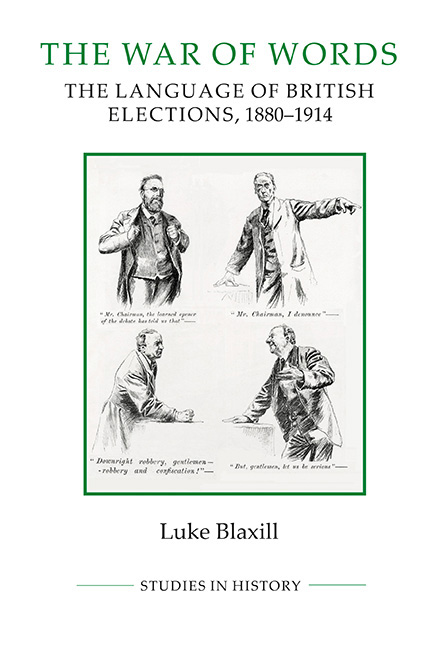Book contents
- Frontmatter
- Contents
- List of figures
- Acknowledgements
- Abbreviations
- Technical glossary
- Introduction : the challenge of reintegration in political history
- 1 On method : text-mining, corpora and the historical study of language
- 2 The impact of reform : the general elections of 1880 and 1885
- 3 The impact of home rule : the general elections of 1886 and 1892
- 4 The impact of imperialism : the general elections of 1895 and 1900
- 5 The impact of New Liberalism : the general elections of 1906 and 19101
- Conclusion: who won the war of words?
- Appendix 1 Technical and methodological
- Appendix 2 Statistical
- Bibliography
- Index
5 - The impact of New Liberalism : the general elections of 1906 and 19101
Published online by Cambridge University Press: 26 April 2020
- Frontmatter
- Contents
- List of figures
- Acknowledgements
- Abbreviations
- Technical glossary
- Introduction : the challenge of reintegration in political history
- 1 On method : text-mining, corpora and the historical study of language
- 2 The impact of reform : the general elections of 1880 and 1885
- 3 The impact of home rule : the general elections of 1886 and 1892
- 4 The impact of imperialism : the general elections of 1895 and 1900
- 5 The impact of New Liberalism : the general elections of 1906 and 19101
- Conclusion: who won the war of words?
- Appendix 1 Technical and methodological
- Appendix 2 Statistical
- Bibliography
- Index
Summary
Electoral politics, 1906–10
By the spring of 1903, by-election results suggested that Balfour's government would lose the next general election. The South African war had dragged on until 1902, the Education Act had angered nonconformists, unemployment was rising and the government seemed bereft of ideas. Beatrice Webb pronounced the Cabinet ‘panic-stricken’ and ‘scared’. It was in this political environment that Joseph Chamberlain launched his tariff reform crusade in May, which was designed to bind colonies to their mother country through introducing a modest range of tariffs on imports from outside the empire. While Chamberlain's policy – which he christened ‘colonial preference’ – was intended to re-energise the flagging Unionist cause, it ended up comprehensively splitting the party between those who backed him (the so-called ‘whole-hoggers’) and those who retained their commitment to free trade (‘free-fooders’). Although by-elections initially indicated that tariff reform had been favourably received by the electorate, the situation turned sour by 1905. By December of that year, Balfour had still not come out in support of the whole-hoggers or the free traders, and under immense pressure from the National Union and Birmingham to fully commit to Chamberlain's scheme, he resigned from office. In a matter of weeks the new prime minister, Henry Campbell-Bannerman, dissolved parliament for an election, in which the Liberals achieved a crushing majority of 128, winning 399 seats on a 5.7 per cent national swing. The Unionists were reduced to just 157 members: the modern party's worst ever result. Historians have disagreed as to whether the landside victory represented the last hurrah for traditional nineteenth-century Liberal values, or whether the emerging philosophical influence of the ‘New Liberalism’ also played a decisive part. However, there seems little doubt that the party's championing of free trade and opposition to tariff reform dominated the campaign, and won them considerable support. The Manchester Guardian was convinced: ‘A candidate had only to be a Free-Trader to get in: whether he was known or unknown, semi-Unionist or thorough Home-Ruler, protestant or catholic, entertaining or dull. He had only to be a Protectionist to lose all chance of getting in, though he spoke with the tongues of angels.’
- Type
- Chapter
- Information
- The War of WordsThe Language of British Elections, 1880–1914, pp. 171 - 228Publisher: Boydell & BrewerPrint publication year: 2020



